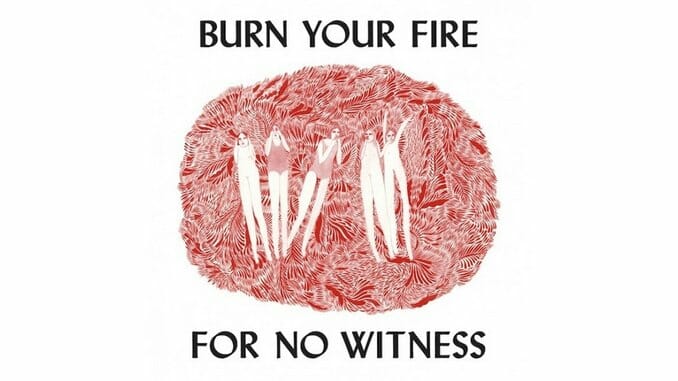
For all the album reviews there are, most leave the critic out of the text. If the author does show up, it is usually for some necessary personal insight, but rarely is it to point out the bias that he or she holds. Everything from the situations surrounding our upbringing to the quality of our coffee this morning affects the listen we give to music. Critics attempt objectivity, which we all know is impossible, but still they try.
Angel Olsen’s beautiful, sad and, ultimately, useful sophomore album, Burn Your Fire for No Witness is not something to be objective about. It’s an experience obsessed with heartbreak, and coming into the record with a heavy heart of your own is excruciating—near-torture—and had I not been assigned to review it, I might have said “no thank you.”
But listening to a collection that hurts to hear, that’s how Angel Olsen deserves to be absorbed, with empathy—knowing her pain and resolve and bravery and using it for your own strength. It’s an album that tells the world that we are not alone. In the First Listen blurb, NPR’s wonderful Bob Boilen also cut the bullshit and concluded with a straight admission: “I’ve been living with this music for a few months, and it’s become my friend, my comfort; it shakes me, saddens me and lifts me.”
I’ll go a step further and say it speaks to me, like Olsen was reading the language of heartbeats and sighed breaths and watery eyes. Closing number “Windows” asks “Won’t you open a window sometime? What’s so wrong with the light? Wind in your hair, sun in your eyes.” She asks more questions, like “Why can’t you see?” and “Are you blind?” and “Are you dead?” and “Are you alright?” and they are repeated to a single point, that she desperately wants to love and to be loved, that it’s as plain and simple as an open window and the sun shining in, and it confuses and crushes and torments her that her object of desire in the song doesn’t see the world the same way she does. It’s the tragedy of any love that doesn’t work, and Olsen seems so freely willing to give that your heart can’t help but break for her, her dry, almost rusty singing voice sounding like pain made audible, like this isn’t her first heartbreak, like she’s endured lifetime after lifetime of them. “Windows” is as good as songs get, the kind that leaves you breathless and wanting desperately not to be as alone as Olsen sounds, or to comfort her, or to somehow receive your own comfort.
Comparisons to Sharon Van Etten’s triumph Tramp seem apt in that Olsen possesses a similar clarity to her emotions and the ability to make fairly common woes sound fresh, like you’ve never contemplated heartbreak before hearing Olsen and her rather loud backing band. On “Forgiven/Forgotten,” she confesses “if there is one thing I fear, it’s knowing that you’re around, so close but not here.” It’s so simple and true that the risk is to dismiss the wisdom and sense of self in the observation. The nearly seven-minute highlight “White Fire” begins with “Everything is tragic, it all just falls apart” and leads to “If you’ve still got some light in you, then go before it’s gone, burn your fire before no witness, the only way it’s done.” The bleakness does not hold, luckily, and “Windows” shows a desire to connect again, a plea for it, but in “White Fire,” we see the pit of despair as a dark place, where the only advice is to take what good you have and hide it away, not letting anyone know what you possess.
Olsen opens the album with “Unfucktheworld” by saying she “started dancing just to be around you,” but the heartache that follows leaves one expecting not much dancing would follow, with Olsen lost in her own personal issues and letting love pass her by. But, on “Dance Slow Decades” Olsen realizes that everything she thought was true might not be, that everything is based on perception. The subjectivity of experience becomes a central theme, allowing one person to think a love could matter so much and another to treat it like nothing. Olsen sings “Don’t look around, it’s not right, it’s not wrong. Dance because you know the song. I dance because I know this one.” The reclaiming of dance for herself, and not tying it to another allows her to love again, allows her to want to share the light on “Windows” with someone again, allows her to get hurt again.
Will this mean a lot to everyone? Probably not, but it means a lot to me and it’s a useful album, full of comfort and advice, and the very true ache that life leaves too often. Olsen shares graciously in her music, and if you are willing, Burn a Fire for No Witness will change your world. Or, actually, it will change how you see your world.